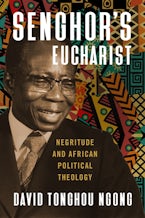In his collection of poems Black Hosts, Léopold Senghor, a leading figure in the Negritude movement and the first president of Senegal, offers the suffering and death of Africans, rather than that of Christ, as a site for the healing of a fractured and antagonistic world. Drawing from literature, history, political science, anthropology, and theology, David Tonghou Ngong’s Senghor’s Eucharist investigates the possibilities and perils of Senghor’s offer.
Ngong argues that, while Senghor might be accused of cheapening African suffering by offering an easy pardon to colonizers and others who have harmed Africans, his work should be situated within the Negritude movement and its intention to revalorize the lives of Africans in a world that often treats African lives as disposable. Indeed, by connecting the suffering of Africans to the central figure of the Christian faith, Jesus Christ, Senghor suggests that at the heart of Western Christianity lies a disturbing betrayal--the refusal of communion, to eat together, as dramatized in the Eucharist. Consequently, if critically engaged, Senghor’s poetic challenge may open up not only avenues through which Eucharistic theology may inform African politics but also serve as a way for African political theology to enact a cosmopolitan vision that is sorely needed in our time.
In an era of increasing global fragmentation along racial, ethnic, sexual, and other lines, reclaiming Senghor’s Eucharistic African vision as found in "Black Hosts" may help us begin to reimagine a new life not only for Africans but also for the rest of humanity. Critically, Senghor urges us to recognize that the life of Africans is necessarily connected to the life of the world--indeed, that Africa itself in all its complexity, tragedy, and triumph is a cruciform vessel through which passes the earth’s redemption and reconciliation.

